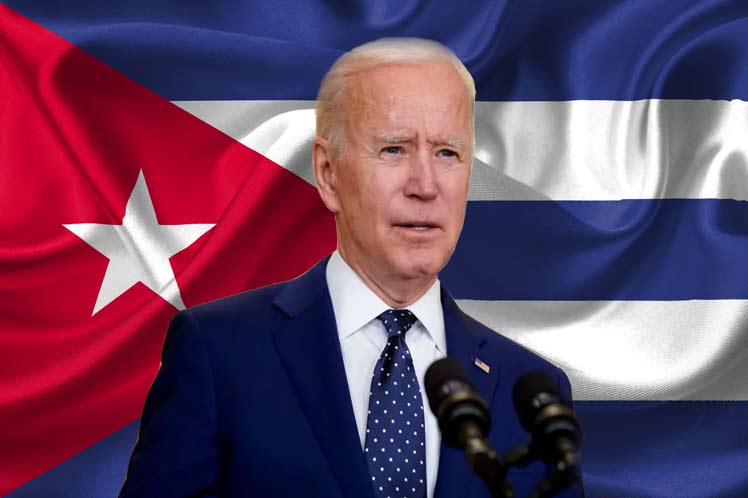Washington: Joe Biden still does not change his policy towards Cuba, a review that takes time for the pleasure of many voters in the United States who demand answers from the now president about his unfulfilled campaign promises, Prensa Latina publishes.
Remittances, travel and the opening of consular services at the Washington embassy in Havana are some of the main claims to loosen, at least a little, the twist that Republican Donald Trump gave to the blockade during his term (2017 -2021).
The executive mansion received recommendations on money transfers to the island, which were severely restricted under the Trump administration, and “we await his decision,” Deputy Assistant Secretary for Western Hemisphere Affairs Brian Nichols said the day before.
He also told lawmakers that the United States would send consular officers on temporary duty to its representation in the Cuban capital to increase visa processing there.
Since Trump decided to dismantle his diplomatic legation on the island, nationals who intend to travel to US territory have seen their procedures become more expensive by having to go to a third country without the guarantee, in addition, that they will receive their visa.
Johana Tablada, deputy director general for the United States of the Cuban Foreign Ministry, when addressing the effects of these coercive measures that intensify the blockade, explained that “migratory and consular matters” are easy evidence of the negative impact of that siege policy.
She recalled that almost five years ago, the government of the current president in the White House, Donald Trump, made the arbitrary decision to close the consular office after “manufacturing lies and science fiction ideas that US diplomats were attacked”
The pretext of the alleged acoustic attacks – now called by Washington “anomalous health incidents” – served Trump to eliminate flights to Cuba, suspend consular services, among a set of 243 measures taken during his term in office, still in force with Biden.
Many wonder how long they will have to continue to suffer from these policies and, for example, pay three times the price of a plane ticket to be close to a family member, Tablada said.
For how long families will be separated, that is one of the effects, but probably one of the most inhumane of US policies, she added.
Regarding remittances, a US official said in November that the White House had received proposals on how to make them.
But some of those suggestions were “returned for further work to ensure that money sent by Cuban-Americans to their families on the island does not fall into the hands of the communist government of Cuba,” she said.
Nachito Herrera, a Cuban musician living in the United States, believes that perspective is sometimes lost because someone might think that this policy “is against the Cuban government.”
In reality, he said, it is “against the families on the island to make them explode and that is why they impose measures and that is why the United States prevents our families from reuniting.”
The current president asked the Treasury Department and the State Department in July to study the matter and report on how to allow the flow of remittance payments, and Nichols did not provide any timetable for a decision on Thursday.
Biden, in the opinion of analysts, faces the dilemma of making a difference, but electoral pressures are very strong.
The midterm elections will be on November 8. All House seats and 34 of the 100 Senate seats will be up for grabs, with Democrats defending their slim majorities.
Not a few observed with hope and at the same time with caution his landing in the White House after four years of a term like Trump’s during which all signs of progress in the recomposition of ties between the United States and Cuba were interrupted.
Biden brought with him -in the opinion of some- the experience of having been vice president in the period of Barack Obama (2009-2017), who in his last stage in the executive mansion admitted that “the hard way”, according to popular jargon, nowhere would be reached with regard to Cuba.
The Caribbean country continued its course, despite all the aggression planned in Washington and the hostility of a blockade that was made official on February 3, 1962 by the then occupant of the Oval Office, Democrat John F. Kennedy.
However, for practical purposes, this unilateral siege began with the triumph of the Cuban Revolution on January 1, 1959.
For Obama, decades of the same policy towards the island did not produce results, although the objective of the 11 administrations that the blockade survived – some with carrots and others with a stick – has been the same: to destroy the social project freely chosen by the majority of the Cuban people.
Nevertheless, the Government of Cuba reiterated more than once its belief in the possibility of a constructive relationship with the United States that respects differences. (BSH)

